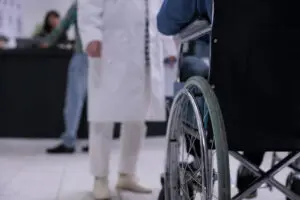At Munley Law, our experienced Allentown medical malpractice lawyers are dedicated to helping malpractice victims of medical mistakes and medical neglect to secure justice and compensation. When you or a loved one suffers harm due to the negligence of a medical professional, the consequences can have devastating long-term, even lifelong effects.
Contact Munley Law firm today to schedule a free consultation. There is no fee unless we win your medical malpractice cases.
$32 Million Wrongful Death
$26 Million Truck Accident
$20 Million Commercial Vehicle Accident
$17.5 Million Car Accident
$12 Million Work Injury
$11 Million Truck Accident
$9 Million Truck Accident
$8 Million Truck Accident
$8 Million Truck Accident
$7.5 Million Auto Accident
$6.9 Million Garbage Truck Accident
$6.5 Million Traumatic Brain Injury
The Role of Allentown Medical Malpractice Attorneys

When you or a loved one has been a victim of medical malpractice, navigating the legal process can be overwhelming. Here are some key reasons to hire an experienced Allentown medical malpractice attorney from Munley Law:
- Investigation and Evidence Gathering: We have the resources to conduct thorough investigations, gather evidence, and consult medical professionals to build a strong malpractice case on your behalf.
- Understanding of Medical Terminology: We understand medical terminology and procedures, enabling us to communicate effectively with healthcare professionals.
- Navigating the Legal Process: Our medical malpractice lawyers handle all aspects of your case, from filing paperwork to negotiating with insurance companies, allowing you to focus on your recovery.
- Maximizing Compensation: Our law firm fight to secure the maximum compensation for your injuries, including medical expenses, lost wages, pain and suffering, and future costs.
- Trial Experience: While most medical malpractice cases settle out of court, our attorneys are prepared to take your case to trial if necessary to ensure you receive the justice you deserve.
Why Choose Our Medical Malpractice Attorney?

Since 1959, people in the Lehigh Valley and throughout Pennsylvania have turned to the medical malpractice attorneys at Munley Law for help. We have earned the highest client and peer review ratings from Martindale-Hubbell. Our client victories speak for themselves.
Our team has extensive experience handling complex medical malpractice cases, from misdiagnoses and surgical errors to medication mistakes and birth injuries.
We operate on a contingency fee basis, meaning you don’t pay any legal fees unless we secure a recovery.
For a free consultation with an Allentown personal injury lawyer, chat live, fill out our contact form, or call today.
Speak with our Allentown medical malpractice lawyers.
Proving Fault in an Allentown Medical Negligence Lawsuit
Medical malpractice occurs when a healthcare provider deviates from the accepted standard of care, harming a patient. Here are key elements that constitute medical malpractice:
- Breach of Duty: Healthcare providers owe a duty of care to their patients. When they fail to provide treatment that meets the accepted standard of care, they breach this duty.
- Negligence: Unlike a medical error, medical malpractice refers to a healthcare provider’s failure to treat a patient reasonably. This can include diagnosis, treatment, surgery, medication administration, or follow-up care errors.
- Causation: The breach of duty and resulting harm must have a direct causal link. In other words, the patient’s injury or worsening condition must be directly attributable to the healthcare provider’s negligent actions or omissions.
- Harm or Damages: To pursue a medical malpractice claim, the patient must have suffered harm or damages due to the healthcare provider’s negligence. This can include physical injuries, emotional distress, additional medical expenses, lost wages, or diminished quality of life.
Examples of medical malpractice include:
- Misdiagnosis (wrong diagnosis) or delayed diagnosis
- Surgical errors: Such as wrong-site surgery or a surgical instrument or other foreign object left inside the patient
- Birth injuries: Any injury caused by medical negligence during pregnancy, labor, or delivery, including brain injuries to the baby sustained during labor or delivery
- Anesthesia errors: An anesthesia mistake leading to complications or injury during surgery
- Failure to obtain informed consent from the patient before a procedure
- Hospital-acquired infections: Due to inadequate sanitation or hygiene practices
- Failure to follow a patient’s Do Not Resuscitate (DNR) order
The Process of Filing a Medical Malpractice Lawsuit in Allentown, PA

Your first step in a medical malpractice case is to schedule a free consultation with a medical malpractice lawyer at our Allentown office. During this meeting, you’ll discuss your case and learn about your legal options. There’s no obligation, so you can decide if you want to proceed after getting professional advice.
If you move forward, we will begin a thorough investigation. We gather all relevant information and evidence related to your case. This step is important for building a strong foundation for your claim. We speak with medical professionals who will review your medical records and confirm that medical negligence has occurred.
Once our investigation is complete, we will send a notice of intent to the medical professionals involved and their insurance providers. This formal notification informs them that you plan to file a claim.
After this, we will officially file the medical malpractice lawsuit. This document will detail the allegations against the healthcare provider and specify the damages you seek.
Once medical malpractice claims are filed, our Allentown medical malpractice legal team will negotiate with the opposing party. The goal here is to reach a fair settlement without going to trial. However, if a satisfactory agreement can’t be reached, your case will proceed to trial, where it will be presented before a judge or jury.
Throughout this process, gathering and preserving evidence is crucial. This includes securing all medical records, such as reports, prescriptions, and test results. If applicable, you should take photographs of your injuries. Statements from witnesses, including other healthcare providers, can also be valuable. Additionally, you’ll need to compile records of all related expenses, including medical bills and lost wages.
Working with medical professionals is another important aspect of a medical malpractice case. These experts can provide testimony on the standard of care and how the error or negligence impacted you. You’ll likely need a comprehensive medical evaluation to detail the extent of your injuries and their projected future impact. Your lawyer will also work with medical consultants to understand the nuances of your case and prepare for trial or negotiations.
Navigating a medical malpractice claim can be complex and emotionally taxing. With the right legal support, such as that provided by Munley Law, malpractice victims and families can traverse this challenging journey with confidence and assurance, ensuring that justice is pursued and their interests are robustly represented and protected.
There is no fee unless we win your case.
The Statute of Limitations for Medical Malpractice Lawsuits in Allentown
In Allentown, Pennsylvania, medical malpractice lawsuits must be filed within two years of when the patient discovered or reasonably should have discovered the injury, with a maximum of seven years from the date of the negligent act. Exceptions apply to minors or individuals with mental disabilities. Acting promptly is crucial, as delays can jeopardize your right to compensation. Consult with an experienced medical malpractice attorney in Allentown to understand your options and protect your rights. Contact Munley Law for a free consultation.
Contact an Experienced Allentown Medical Malpractice Lawyer for a Free Consultation
If you or a loved one has been injured due to a mistake by a healthcare provider during surgery or any routine medical treatments, you might have medical malpractice claims. If a malpractice victim think you might be entitled to recover financial damages for your economic and other losses, call or message a Lehigh Valley medical malpractice lawyer at Munley Law today for a free initial consultation about your case.
Healthcare professional is obligated to uphold standards of care. When they fail, Munley Law takes over to protect injured clients. Trust our medical malpractice law firm to recover your maximum compensation.









